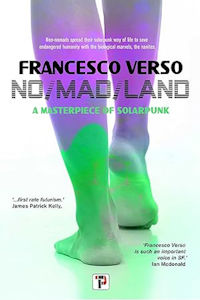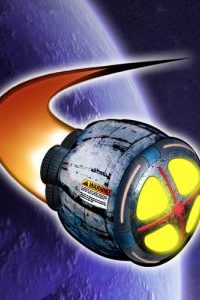No/Mad/Land by Francisco Verso: Review by Paul Di Filippo
 No/Mad/Land, Franceso Verso (Flame Tree Press 978-1787589278, hardcover, 384pp, $26.95) September 2024
No/Mad/Land, Franceso Verso (Flame Tree Press 978-1787589278, hardcover, 384pp, $26.95) September 2024
Even when deploying familiar tropes of the genre in totally au courant ways, science fiction by non-Anglo authors always reveals an idiosyncratic slant or attitude or worldview. This has been evident at least since Stanislaw Lem burst onto the English-language publishing scene, and is witnessed more recently in works from such accomplished authors as Cixin Liu, Hannu Rajaniemi and Karin Tidbeck.
Francesco Verso, a prize-winning Dean of Italian SF writers, drives home this point—incidental to everything else he accomplishes—with his two-novel sequence, Roamers and No/Mad/Land, together dubbed I camminatori, or The Walkers. (Really, it’s a single novel published as two books: the final chapter in Roamers is Chapter Twenty-eight, while the first chapter in No/Mad/Land is Chapter Twenty-nine.). Verso’s saga, centered at first in Rome, and then the Italian countryside and far beyond, gives us, in broad terms, a scenario we’ve seen before: anti-authoritarian rebels breaking away from the Establishment, aided by new technologies and hoping to create a new society. But the tale has a kind of sprezzatura vibe to it not found in other works. The rebels aren’t fighting Big Brother, or trying to uphold the Declaration of Independence, or addressing social justice inequities. They’re just kinda bummed because the wonderful traditional European lifestyle involving sitting for half the days at a café with plenty of espresso and vino is being cramped. In a way, it’s the closer to the ethos of a classic Hippie rebellion than any other recent SF book.
But before diving in, we must pass out plaudits to Jennifer Delare (Roamers) and Sally McCorry (No/Mad/Land) for their excellent, colloquial, highly readable translations. They form the essential bridge between two worlds.
The story is conveyed through sections that alternate the POV character (not in a first-person but in a third-person sense), allowing us good insights into the depths of each cast member.
And so—after a kind of future history synopsis—we first meet Miriam Farchi, a middle-aged mom of an adult son named Alan. She’s a good citizen, good job, no desire to lash out at society. But then Alan—who works in a “Globalzon” warehouse—suffers an on-site injury that leaves him paralyzed. Naturally, the corp takes no responsibility, and medical options are slim or unaffordable. Desperate for any means to cure Alan, Miriam hooks up with an altruistic nanite-pusher named Ivan Shumalin. The connection derives mainly through a certain Silvia Ruiz, who is a Pulldog.
The Pulldogs are the rickshaw haulers of Rome. This mode of conveyance was added as kind of a green tourist measure. But the Pulldogs also seem to exhibit superhuman prowess. It’s down to the nanites flowing through their veins, and soon enough Alan gets a dose and Miraim throws over her own respectability in disgust at society’s callousness.
Alan takes up with the Pulldogs, quickly becoming their leader, insofar as they have one. The posse has been living in a little low-key hidden commune in Rome, but Alan convinces them to take over an entire abandoned highway viaduct. They will become visible idealistic public squatters and attract legions of the dissatisfied to their cause, just by living their lives. The classic “Temporary Autonomous Zone” postulated by Hakim Bey. (That one of the Pulldogs is named Hakim is probably no accident.)
Another major figure enters the scene after the commune has been around for a few years: Nicolas Tomei. At three hundred pounds, elegantly dressed, he is almost Wildean in his lifestyle, including his vocation as “the poet of perfumes,” designer of boutique scents. (I should mention here that home matter-printers have been perfected, allowing folks to “print” just about anything. Yet these commodified gadgets have not led to a post-scarcity world. One still has to buy feedstock, after all.) However, underneath his glamorous lifestyle, Nicolas is also full of anxiety and angst, unhappy with the demands placed on him by a tyrannical father. When he encounters his childhood friend—Silvia—not seen in decades, his descent—or ascent—into outlaw loucheness is assured. And his adoption of the nanites renders him slim.
After five years or so, the authorities have had enough. A siege of the viaduct is conducted, and although is ends in a negotiated fashion after many exciting tussles, the Pulldogs realize Rome is no longer for them. Nicolas says:
“Because this is the land of a promise that’s been broken. You know it as well as I, that we walkers don’t need the city, just like the city doesn’t need us. This life of ours has no place within a system of artificial competition, where dreams are standardized, imagination is industrialized, and creativity is something to be traded away. When things take a turn for the worse, it is better to try to update our species’ software than insist on trying to make the original version run on hardware that is not suited to cope with the demands of modern life.”
And so, with a general consensus, the tribe departs Rome for the open road, like a Children’s Crusade.
Thus ends Roamers.
Picking up No/Mad/Land, we find the tribe truly earning their name of Walkers. (One recalls the real life group of rootless Irish Travelers, who refer to themselves as “the walking people.”) Slowly but surely they navigate through Italy, meeting friends and hostiles on their way. But a more consequential thing is also happening. Nicolas has composed an upgrade on their nanites, the “heliotrons.” These allow complete bodily independence from food, and offer other powers as well. Molting your entire epidermis at intervals and feeling like you’ve got the worst case of the flu is a small price to pay.
Also, Alan and Silvia are to have a child, christened Nika: the first creature born with nanites already in her body.
After some adventures, the posse ends up on the shores of the Adriatic, for a rendezvous. Ivan Shumalin has reappeared, this time as a founder of the Green Ark, a former military aircraft carrier repurposed as a floating jungle and biome.
Landing in Turkey, the Pulldogs undergo something formerly unimagined: the commune splits in two. Nicolas has a plan to head south, into North Africa, while Alan wants to head into Russia. At this point the narrative chooses to focus on Nicola’s journey and fate, leaving us curious about Alan & company. When we finally rejoin them at their Russian “nest,” we find that Nika is eight years old. Now we inhabit her POV, as circumstances draw both factions back to where it all began: Rome, the Eternal City.
Besides being a kind of biopunk utopia, this is a very philosophical novel, somewhat in the manner of those Victorian utopias like Erewhon. “And so, stranger from another land, now you understand why we Uplifted Ones process our sewage according to the tenets of the Great Master, who revolutionized society in that pivotal year of 1924, so far distant from your birth.” But Verso of course is much more sophisticated, couching his arguments and counter-arguments in realistic dialogue that derives naturally from each character’s interest and personality.
The book also belongs in the grand tradition of radically transformative SF that goes way back to Wells’s The Food of the Gods, proceeds through Odd John and The Dragon Masters, and culminates in a modern masterpiece like Queen City Jazz. It’s a chronicle of the birth of homo superior, and like all births, it’s messy, dangerous and unpredictable. The decision to close out the book from Nika’s viewpoint conveys an ultimately optimistic assertion of success.
It is also an exploration of outsider communities, harking back to tales such as Delany’s “We, in Some Strange Power’s Employ, Move on a Rigorous Line” and Varley’s “The Persistence of Vision”. And it is certainly no coincidence that the Pulldogs call their community a “nest,” as does Michael Valentine Smith.
Verso successfully conjures up what new strange rituals and beliefs and conventions such altered people would invent. His Utopia isn’t perfect, but it’s tangible and attractive and logical.
We might summarize The Walkers saga, a wise, inventive, challenging and thought-provoking omnibus, with this observation that occurs at a pivotal moment in Nico’s quest:
To travel is to accept transformation, the discovery that no step is the same as another and every movement is different to the preceding one. It is knowing to know oneself. It is the only route leading to yourself.
Interested in this title? Your purchase through the links below brings us a small amount of affiliate income and helps us keep doing all the reviews you love to read!
 While you are here, please take a moment to support Locus with a one-time or recurring donation. We rely on reader donations to keep the magazine and site going, and would like to keep the site paywall free, but WE NEED YOUR FINANCIAL SUPPORT to continue quality coverage of the science fiction and fantasy field.
While you are here, please take a moment to support Locus with a one-time or recurring donation. We rely on reader donations to keep the magazine and site going, and would like to keep the site paywall free, but WE NEED YOUR FINANCIAL SUPPORT to continue quality coverage of the science fiction and fantasy field.
©Locus Magazine. Copyrighted material may not be republished without permission of LSFF.







